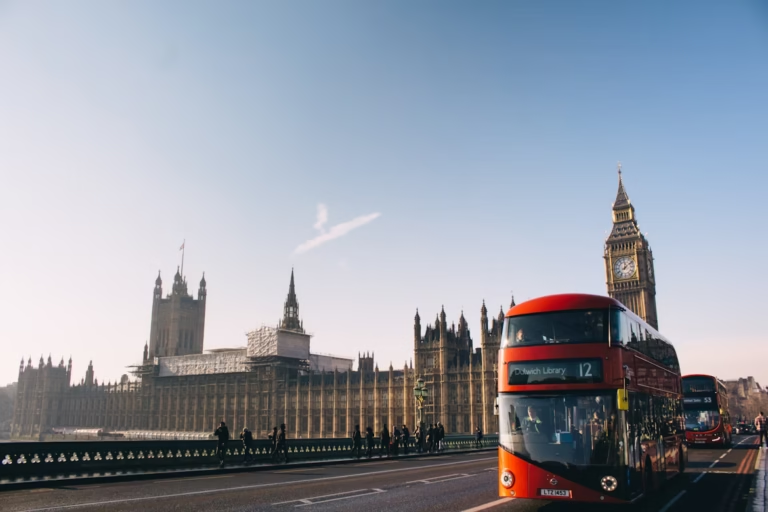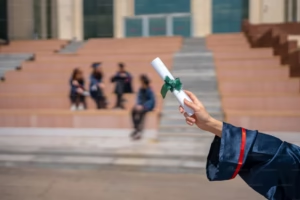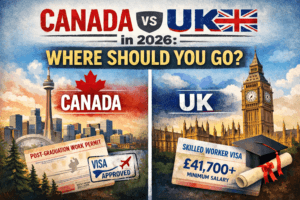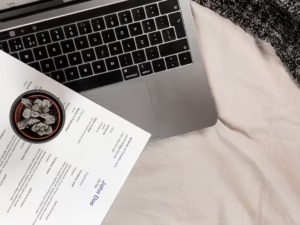Planning to embark on an exciting academic journey to the United Kingdom?
Congratulations! Studying abroad is a life-changing experience, and careful preparation is key to ensuring a smooth transition. A vital part of that preparation is packing strategically. This comprehensive packing list for the UK for students by IMFS serves as your essential guide to navigating the complexities of international travel and settling into student life. Whether you’re figuring out what to pack for the UK from India or simply seeking a reliable UK packing guide, this guide provides clarity on what to bring – and, equally important, what to leave behind.
We understand that preparing for an international move can be overwhelming, and the thought of forgetting something important can add to the stress. That’s why this complete packing list of do’s and don’ts for students moving to the UK is designed to alleviate your anxieties and empower you to pack with confidence. We aim to answer “What essential items should I pack for my studies in the UK?” while also addressing the common question of “Should I buy winter clothes in India or the UK?”.
Furthermore, if you find yourself needing personalised support to alleviate these concerns, IMFS’s counselling services offer tailored pre-departure guidance and cultural acclimation assistance to ensure you feel fully prepared for your new adventure.

What are the Absolute Essential Items I Must Pack?
Packing the right essentials is critical for a comfortable and hassle-free arrival in the UK. Prioritise these items to ensure you have everything you need for your first few weeks.
1) Passport and Visa:
These are, without a doubt, the most critical documents you’ll need. Ensure your passport is valid for the duration of your stay and that you have the correct visa type for your studies. Keep your passport and visa in a secure, easily accessible location, such as a travel wallet or document organiser. It is also wise to make several copies of these documents and store them separately from the originals, both physically and digitally. In case of loss or theft, having copies will significantly expedite the replacement process. Also, remember to inform your bank and mobile carrier about your travel plans.
2) University Acceptance Letter:
This official document confirms your acceptance into your chosen university. It’s essential for immigration purposes and will be required during your initial registration at the university. Keep both the original and a copy readily available in your carry-on luggage. Having a digital copy on your phone or tablet is also a good idea. Authorities and organisations will request this document at various stages, such as when you open a bank account or apply for a student discount card, to verify your status as a student in the UK. Having it on hand will save you time and potential headaches.
3) Scholarship or Funding Documentation:
If you are receiving any scholarships, grants, or other forms of financial aid, bring the original and copies of all relevant documentation. This includes award letters, bank statements, and any other paperwork that verifies your funding. Universities or immigration authorities may require these documents to confirm your financial stability. Keep these documents organised in a secure folder and make digital copies for safekeeping. You may also need these documents when applying for a National Insurance number, so it’s best to be prepared.
4) Health Records and Vaccination Records:
Ensure you have copies of your medical history, including any pre-existing conditions, allergies, and current medications. Most importantly, bring your vaccination records, since universities or healthcare providers may require them for registration or access to services. If you have any specific medical needs, it’s a good idea to obtain a letter from your doctor outlining your condition and treatment plan. This will be helpful if you need to seek medical care in the UK. Ensure your records are translated into English if necessary.
5) Prescription Medications (with Prescription):
If you take any prescription medications, pack a sufficient supply for the first few weeks of your stay. Be sure to bring a copy of your prescription from your doctor, since pharmacies in the UK will require it to refill your medication. It is important to research the regulations regarding your specific medication in the UK, as some medications may be restricted or require special authorisation. Keep your medication in its original packaging and store it in your carry-on luggage to avoid any issues during customs inspections. This ensures you can continue your treatment without interruption while you register with a local doctor.
6) Travel Insurance Details:
Obtain comprehensive travel insurance that covers medical expenses, trip cancellations, and lost or stolen belongings. Keep a copy of your insurance policy and emergency contact information readily accessible. Familiarise yourself with the terms and conditions of your insurance policy, including any exclusions or limitations. It’s also a good idea to inform your family or emergency contacts about your travel insurance details. In case of an emergency, having this information readily available will be invaluable.
7) Small, Lightweight Backpack:
A comfortable and lightweight backpack is essential for everyday use. You’ll need it for carrying your books, laptop, and other essentials to class. Choose a backpack with padded straps and multiple compartments to help you stay organised. Consider a backpack with water resistance in case of rain. A compact backpack that can double as a daypack for weekend trips is an excellent investment.
8) Comfortable Walking Shoes:
You’ll likely be doing a lot of walking in the UK, whether you’re exploring your university campus or discovering new cities. Pack a pair of comfortable walking shoes that can withstand long hours of wear. Choose shoes that are well-cushioned and provide good support. Waterproof or water-resistant shoes are a good option, especially during the wetter months. Break in your shoes before you leave to avoid blisters.
9) Universal Adapter:
The UK uses Type G power plugs, so you’ll need a universal adapter to charge your electronic devices. Choose an adapter that is compatible with multiple plug types and voltage requirements. Consider buying a few extra adapters for convenience. A universal adapter with USB ports is also a good option for charging your phone and other USB-powered devices. You may want to buy UK-specific adapters when you arrive for even greater convenience.
10) Small Amount of Local Currency:
While you’ll primarily rely on your debit or credit card, it’s a good idea to bring a small amount of British Pounds (GBP) for immediate expenses upon arrival, such as transportation from the airport or a quick meal. Check the exchange rate before you travel to ensure you’re getting a fair deal. Avoid exchanging large amounts of currency at the airport, as the exchange rates are typically less favourable. Consider using a travel credit card that doesn’t charge foreign transaction fees.
What are Some Things I Should Absolutely Not Pack and Buy in the UK Instead?
To save space, weight, and potentially money, avoid packing certain items that are readily available and often more affordable in the UK.
Firstly, refrain from packing bulky winter clothing, especially if you’re travelling from a warmer climate. Winter coats, heavy sweaters, and thermal underwear are readily available in the UK, particularly during seasonal sales. Not only will this save you valuable luggage space, but you’ll also find that the local styles and materials are often better suited to the UK climate.
Secondly, resist the urge to pack large quantities of toiletries such as shampoo, conditioner, and shower gel. These items take up significant space and weight, and they can easily be purchased in the UK at competitive prices. Buying toiletries locally will also save you from worrying about potential leaks or spills during travel.
Thirdly, textbooks, if required for your courses, are often best purchased upon arrival at your university bookstore or online. Shipping costs for heavy textbooks can be prohibitive, making it more economical to buy them in the UK. Furthermore, you’ll ensure you have the correct editions and required materials for your specific courses.
Finally, large appliances like hair dryers or straighteners may not be compatible with the UK voltage and are inexpensive to replace. Bringing these appliances could pose a safety risk and may require a voltage converter, which can be bulky and unreliable. It’s more practical and cost-effective to purchase these items in the UK.
How Many Traditional Indian Clothes Should I Bring for Events?
The number of traditional Indian clothes to pack depends on your personal preferences and the frequency of cultural events you anticipate attending. As a general guideline, bringing 2-3 formal outfits for religious festivals or Diwali celebrations is a good starting point. These outfits should be suitable for special occasions and cultural gatherings.
Also, packing 1-2 casual outfits for everyday wear or smaller gatherings allows you to maintain a connection to your culture. These outfits can be more versatile and comfortable for everyday wear. However, remember that the UK has a diverse range of clothing options, and you can always purchase more traditional attire either online or in specialised shops if needed.
Keep luggage space in mind and prioritise versatility when deciding which traditional clothes to bring. Choose outfits that can be mixed and matched or adapted to different occasions. Remember that you can always supplement your wardrobe with more traditional attire once you’re settled in the UK.
What Kind of Electronics and Power Plug Adapters Will I Need?
The United Kingdom uses Type G power plugs (3-pin). Ensure you bring at least one universal travel adapter that converts your devices’ plugs to Type G. Consider purchasing additional UK-specific adapters upon arrival for convenience, especially if you have multiple devices to charge.
Regarding electronics, bring your laptop, phone, and any essential peripherals. Check the voltage requirements of your devices; most modern laptops and phone chargers are dual-voltage (110-240V), making them compatible with the UK’s 230V electricity supply. If you bring any single-voltage devices, you will need a voltage converter.
It is also important to note that buying electronics in the UK might be more affordable, considering international warranty and potential import duties. Consider purchasing any non-essential electronics once you arrive in the UK to take advantage of local pricing and warranty coverage.
Conclusion
By following this UK packing guide, you’ll be well-prepared for your studies in the UK. A well-thought-out packing list for the UK for students sets the stage for a successful and enjoyable study abroad experience. If you’d like personalised assistance in tailoring this advice to your specific circumstances and addressing any remaining concerns, we encourage you to contact us for a consultation. Our team of experienced counselors at IMFS is dedicated to helping you prepare for your new life in the UK with confidence, ensuring a smooth and rewarding transition.
FAQs
1. The guide says to buy winter clothes in the UK. Should I not pack any jacket at all? What should I wear when I land?
You should absolutely pack one all-purpose, waterproof, and windproof jacket in your carry-on or checked luggage. You will need this the moment you land, as it will likely be cold, rainy, and windy, especially if you arrive in the autumn or winter. The advice to “buy in the UK” refers to bulky items like heavy wool coats or parkas. You can buy these during seasonal sales in the UK, as they will be better suited to the specific climate (e.g., more focused on rain and wind) than many Indian winter coats.
2. How do I get my prescription refilled in the UK once my initial supply from India runs out?
You cannot use an Indian prescription directly at a UK pharmacy. One of your top priorities in your first week must be to register with a local doctor (a “GP” or General Practitioner) through the National Health Service (NHS). This is free for students. Once registered, you will book an appointment, show the GP your Indian prescription and doctor’s letter, and they will issue you a new UK prescription that you can take to any local pharmacy (like Boots or Lloyds).
3. I have electronics from India, like a rice cooker or hair straightener. Will they work with just an adapter, or do I need a converter?
This is a common and costly mistake. You must check the voltage.
- Dual-Voltage (e.g., 110-240V): Most modern laptops and phone chargers are dual-voltage. They will work perfectly fine with just a simple Type G plug adapter.
- Single-Voltage (e.g., 220-240V): Some Indian appliances might be 240V, which is compatible with the UK’s 230V. However, if your device is 110V (common for US items) or a different single-voltage, it will be destroyed if you plug it in with just an adapter. A voltage converter is bulky and unreliable. It is almost always cheaper and safer to buy new, UK-specific appliances like hair dryers or rice cookers after you arrive.
4. How much cash (GBP) is a “small amount” for my arrival? And what’s the safest way to carry my tuition fees?
A “small amount” of cash is typically £200 – £300 (GBP). This is enough to cover your airport transfer (taxi/train), a meal, and any immediate small purchases before you can get to a bank. NEVER carry your tuition fees or large sums of living expenses in cash. The safest ways to carry this money are:
- Forex Card: A pre-loaded multi-currency travel card.
- Bank Transfer: Wire the money directly from your Indian bank to your new UK bank account after you have opened it.
- Demand Draft: A bank-issued check that you can deposit.
5. Can I pack Indian spices, masala, and food items in my luggage? Are there restrictions?
Yes, you can bring many “home comforts,” but with strict rules.
- Allowed: You can bring most dried spices (masala), tea, biscuits, and sealed packets of snacks in your checked-in luggage.
- Not Allowed: You CANNOT bring most fresh food, especially meat, dairy (like paneer or ghee), fish, and fresh fruits or vegetables. Declaring is key: if you are unsure, declare it to customs. Bringing a small, sealed packet of your favourite spice mix is fine; bringing fresh homemade barfi is risky and may be confiscated.
6. The blog says to buy textbooks in the UK. Are there cheaper alternatives to the university bookstore?
Yes. Never buy new textbooks from the university bookstore unless it’s your only option. Instead:
- University Library: This should be your first stop. They will have multiple copies of all required reading, which you can borrow for free.
- Second-hand: Check noticeboards in your department or student union, as graduating students often sell their old books for very cheaply.
- Online: Websites like Amazon UK, AbeBooks, or Blackwell’s often sell used or discounted copies.
- E-books: Check if a digital version is available, as it’s often cheaper.
7. Should I pack kitchen items from India, like a pressure cooker, spices, or a tawa (griddle)?
This is a personal choice, but here’s a good guide:
- Spices: Yes, bring small, sealed packets of your essential masalas to get you started. You can find most spices in the UK (especially in larger cities), but they might be more expensive or less familiar.
- Pressure Cooker/Tawa: These are heavy and bulky. You can buy them in the UK from stores like Argos or from Indian grocery stores in cities like London, Birmingham, or Manchester. However, if you have a specific brand you love and you have the luggage space, many students do pack one. Just make sure your pressure cooker is not an old model that could be a safety concern.
8. What is the golden rule for packing documents? Which ones go in my carry-on vs. my checked-in luggage?
The golden rule is: If your life or student status depends on it, it NEVER leaves your side. All essential documents MUST be in your carry-on backpack or handbag. This includes:
- Passport and Visa (BRP Letter)
- University Acceptance Letter (CAS Letter)
- Scholarship/Funding Documents
- Tuberculosis (TB) Test Certificate
- Accommodation Contract
- Prescriptions
- Flight Tickets. Your checked-in luggage can be delayed or lost. Your academic certificates (copies are fine), health records, and other “important but not critical-for-entry” documents can be in your checked bag, but it’s safer to have digital copies of everything on a cloud drive.
9. What documents do I need to open a UK bank account as soon as I arrive?
Opening a bank account is a top priority. Most UK banks (like Lloyds, Barclays, or Santander) will require two key things from a student:
- Proof of Identity: Your Passport and Biometric Residence Permit (BRP) (which you collect after you arrive).
- Proof of Address: This is the tricky one. The easiest way is to get a “Bank Letter” from your university’s student services or registry office as soon as you enrol. This letter officially confirms your UK student address.
10. What are the typical baggage allowance limits for international students, and is it worth paying for extra luggage?
Baggage allowance is a major benefit for students. Most international airlines (like Air India, Vistara, British Airways) offer a generous student allowance, which is often two 23kg bags (total 46kg) for checked-in luggage, plus one 7-8kg carry-on bag and a laptop bag. Check your specific airline’s “student baggage” policy. It is usually not worth paying for a third bag. It’s almost always cheaper to leave behind non-essential items (like toiletries, bedding, or kitchenware) and simply buy them in the UK than to pay the airline’s excess baggage fees.





